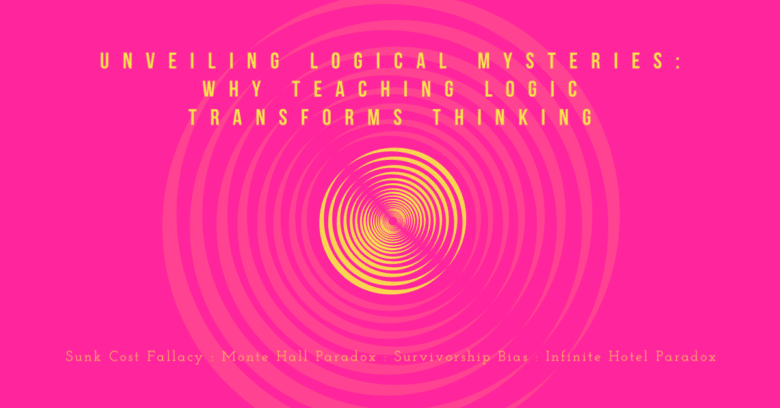Unveiling Logical Mysteries: Why Teaching Logic Transforms Thinking
In today’s rapidly evolving world, critical thinking and decision-making skills are invaluable. To equip our students with the necessary tools to navigate life’s complexities, introducing them to fundamental logic concepts is essential. Among these, the sunk cost fallacy, the Monty Hall paradox, survivorship bias, and the infinite hotel paradox stand out for their compelling insights into human reasoning and the paradoxes of probability and infinity. In addition to being fun to discuss with tutors, friends, and family, understanding these concepts can significantly enhance our students’ cognitive abilities, encouraging a more analytical and reflective approach to school and life.
The Sunk Cost Fallacy: Learning to Let Go
The sunk cost fallacy occurs when we continue a venture because of previously invested resources (time, money, effort) rather than future benefits, leading us to make irrational decisions. Teaching this principle helps students understand the importance of assessing situations based on future value rather than past losses. It cultivates an ability to make more rational economic and personal decisions, ensuring resources are allocated more efficiently and emotional biases are minimized.
The Monty Hall Paradox: A Lesson in Probability
The Monty Hall paradox, named after the host of the game show “Let’s Make a Deal,” challenges our understanding of probability. Participants often struggle with the concept that switching their initial choice, after one of the non-chosen doors is revealed to have a non-prize behind it, increases their chances of winning. This paradox illustrates the counterintuitive nature of probability theory and emphasizes the importance of reassessing initial decisions based on new information. Teaching this concept fosters a deeper understanding of statistical reasoning and the ability to apply probabilistic thinking in everyday life.
Survivorship Bias: Seeing the Full Picture
Survivorship bias is the logical error of concentrating on the people or things that “survived” some process while inadvertently overlooking those that did not because of their lack of visibility. This bias can lead to overly optimistic beliefs because failures are ignored. Highlighting this concept in educational curricula can improve critical thinking skills, encouraging students to consider all available data before making conclusions and to recognize potential biases in their analyses.
The Infinite Hotel Paradox: Exploring the Infinite
The infinite hotel paradox, introduced by mathematician David Hilbert, is a thought experiment that illustrates a hotel with an infinite number of rooms that can still accommodate additional guests even when it’s “full.” This paradox teaches the intriguing concepts of infinity and mathematical induction, pushing students to expand their understanding of the universe and the mathematical frameworks that describe it. It opens up new ways of thinking about space, resources, and the mathematical infinite, enhancing cognitive flexibility and creativity.
Integrating these logical concepts into educational curricula is not just about teaching abstract thinking but about preparing students to face the complexities of the real world. They offer invaluable lessons on decision-making, probability, critical thinking, and the philosophies of mathematics and economics. By exposing students to these ideas, we equip them with the tools to make informed decisions, challenge their preconceptions, and foster a lifelong love of learning and exploration. In essence, these concepts don’t just illuminate the intricacies of logic and mathematics; they also shed light on the human condition, teaching us about our limitations, biases, and the potential for rational thought.


Comments are closed.